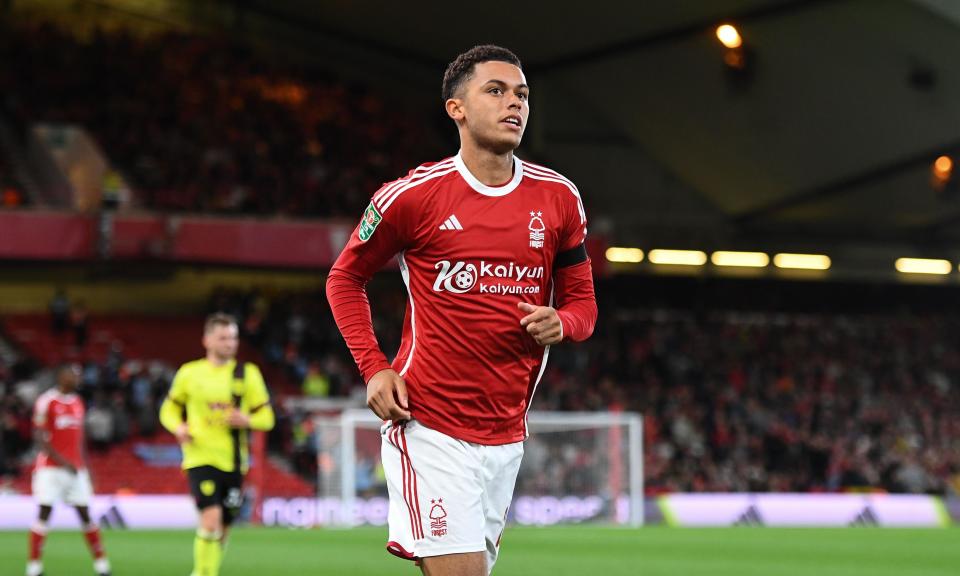Tottenham agree £47m deal with Nottingham Forest for Brennan Johnson

Tottenham confirmed the £47.5m signing of Brennan Johnson from Nottingham Forest on the stroke of the 11pm transfer deadline after a day in which they failed to offload some of their unwanted players.
The London club had prioritised the addition of Johnson, the manager, Ange Postecoglou, seeing the forward as the ideal fit for his style and, after a week of negotiations with Forest, they were able to secure him to a six-year contract.
Spurs loaned Sergio Reguilón and Japhet Tanganga to Manchester United and Augsburg respectively but they were unable to move out Hugo Lloris, Eric Dier, Davinson Sánchez, Pierre-Emile Højbjerg or Tanguy Ndombele, leaving them with 19 non-locally trained senior players. Premier League rules permit only 17 in a squad of 25 – which must be submitted by 13 September.
Related: Transfer deadline day: Liverpool reject £150m Salah bid, Spurs agree £45m Johnson deal – live
Lloris’s situation, after a stellar 11-year career at the club, is strange. Postecoglou had said earlier in the day that he would not have two non-homegrown goalkeepers in his squad – his starting goalkeeper is the Italian, Guglielmo Vicario, who was signed in June from Empoli.
Spurs could cancel the final year of Lloris’s contract and there are still some transfer windows open – most notably that in Saudi Arabia, although it is unclear whether Lloris would want to go there. The windows in the major European leagues are now shut.
Postecoglou will also have to omit another player and it could come down to a decision between Dier and Ndombele, neither of whom have featured so far this season. Dier, the 49-cap England international, is classed by the Premier League as a non-homegrown player as he was raised from the age of seven in Portugal.
Johnson, who will not be available for Spurs’s game at Burnley on Saturday having missed the registration deadline, had been coveted by a host of clubs including Chelsea, Aston Villa, West Ham and Brentford. But Spurs acted decisively for the 22-year-old Forest youth product who scored eight Premier League goals last season.
Capped 20 times by Wales, Johnson played mainly off the right flank for Forest but he can work off the left or through the centre. Blessed with pace and quick feet, the Forest academy product bolsters Postecoglou’s options as Spurs enter the post-Harry Kane era. The manager’s current front three from right to left is Dejan Kulusevski, Richarlison and Son Heung-min.
It was a busy end to a chaotic window at Spurs where Postecoglou – himself a new hire – has worked without a sporting director following the resignation of Fabio Paratici in late April.
Augsburg will be obligated to buy Tanganga for €6m (£5.2m) if he makes a certain number of appearances for them while there is a January break clause on both sides – as there is in Reguilón’s loan to United.
Spurs saw Højbjerg turn down a move to Fulham and a late loan bid from Atlético Madrid come to nothing. The difficulty in shifting Højbjerg meant that Spurs could not take Conor Gallagher from Chelsea. They also failed with a £20m bid for the Bournemouth centre-back Lloyd Kelly, and a move for Chelsea’s Trevoh Chalobah.
Postecoglou described the summer window as “unusual” in terms of how the club have sought to drive wholesale change without a sporting director. The chief scout, Leonardo Gabbanini, has taken on a prominent role with Paratici offering advice in the background. Postecoglou made it clear he expected the appointment of a sporting director sooner rather than later. Scott Munn, hired as the chief football officer, has still not officially started.
“Where there’s a new manager and no sporting director I think anyone would say it’s unusual,” Postecoglou said. “Usually you’d have one or the other. Here, you’re going into a window where a lot of things that are usually embedded aren’t there.
“Am I expecting a resolution soon? Yes. That’s the club’s plan. It’s fair to say that going into the window, there was no point in rushing that appointment, particularly with a new manager in. The thinking behind it was that probably the best way to charter this unusual process is to have as less involvement with new people as possible. I think we’ve navigated the period pretty well.
“I like working with a sporting director because they do most of the leg work that I just don’t have the time to do. When you’ve got a good sporting director you work together. They see the game through your eyes and they say: ‘This guy is going to be perfect for you.’”

 Yahoo Sport
Yahoo Sport 



































































